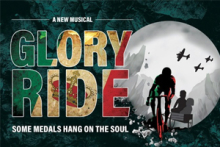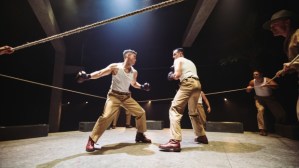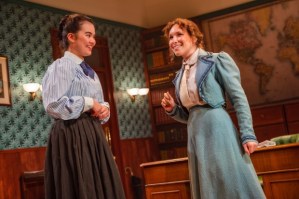”Glory Ride” at Charing Cross Theatre – review

© Marc Brenner
Glory Ride is based on the remarkable true story of heroic Tour de France-winning cyclist Gino Bartali who was instrumental in the survival of hundreds of Jewish children under Mussolini’s fascist rule during World War II in Italy. He smuggled out identity documents and then actual humans under the pretence of his cycle training regime and was rewarded with a Righteous Among The Nations honour for his efforts.
It’s such a strange story that it could only be true, and the knowledge that this really happened is the main thing, apart from the performances and the clarity of director Kelly Devine’s staging, that makes this well-intentioned but inept musical worth the watching, and gives it a couple of moments of genuine emotional punch. It’s certainly not the derivative score and book of father-and-daughter creative team Victoria and Todd Buchholz which has all the subtlety and flair of a mediocre school play, apparently stuck in a sub-1970s Andrew Lloyd Webber hinterland of driving rock guitars, aggressive percussion, soupy balladry, and declamatory storytelling.
It’s not that it’s all actively bad (well, ok, the lyrics really are dreadfully banal, apparently forever determined to find a rhyme at the cost of dramatic gravitas) but it never feels fresh. Ms Buchholz’s melodies are attractive, but aren’t particularly Italianate and could be slotted into almost any other indifferent musical of the last forty years. There’s a song for almost every plot development and that gets pretty numbing, although the odd number does break through: there’s an incidental second act comic showstopper “Green Eye Shades” about trying to get money out of the Catholic Church, which hints at how much better the whole show might have been had the authors gone down a more satirical route, and leading lady Amy Di Bartolomeo has the sort of roof raising belt that elevates everything she unleashes her vocal chords upon. The script is so paltry as to make one wonder whether this might have fared better as a sung-through musical, which might also have helped deflect attention from the inconsistent Italian accents, and the unintentionally hilarious one-note depiction of Mussolini’s infamous Blackshirts.
Devine’s production tells the story effectively but is hampered by sloppy lighting, an uninspired unit set, and a raw, overly loud sound design. The voices, which are generally fabulous, sometimes sound as though they are coming out of loudspeakers rather than human beings. When it works it’s due largely to the cast, who deliver commendable, full-throated work that succeeds some of the time in covering up the shortcomings in the material, despite the fact that some of the supporting players seem to spend most of the evening performing backing vocals offstage.

© Marc Brenner
The Buchholz’s have set up Bartali as a sort of pedal-pushing Jean Valjean to the tormented fascist Javert of former childhood friend-turned-Mussolini collaborator Mario. Josh St Clair and Fed Zanni respectively inhabit these roles with considerable passion and power, and sing as though their lives depend upon it. St Clair has a dashing athleticism reminiscent of a slightly younger Ramin Karimloo, and Zanni affectingly suggests a beating heart beneath all the brooding intensity. Di Bartolomeo’s feisty artist is beautifully acted, stunningly sung and exudes star quality (somebody cast this woman as Evita pronto), and, in a gloriously funny and unexpectedly touching comic turn, Daniel Robinson comes close to stealing the show as an uptight accountant who becomes embroiled in Bartali’s noble rescue scheme. Niall Sheehy shines vocally and dramatically as a benign and brave Cardinal.
It is undoubtedly an extraordinary story, but as a musical, Glory Ride gets repeatedly bogged down in overwrought emotions, underpowered writing, and peripheral characters. For all the intelligence and craft of Devine’s staging, it can’t make sense of the disparate elements, and the show feels hemmed in on Charing Cross’s small stage. The overall tonal uncertainty is nowhere better typified than by the decision to have a jolly cart flogging (very good) gelato right outside the auditorium: it’s like, you’ve just watched a heartfelt reenactment of some of the darkest days in Italian history, and now you can try the local dessert.

















